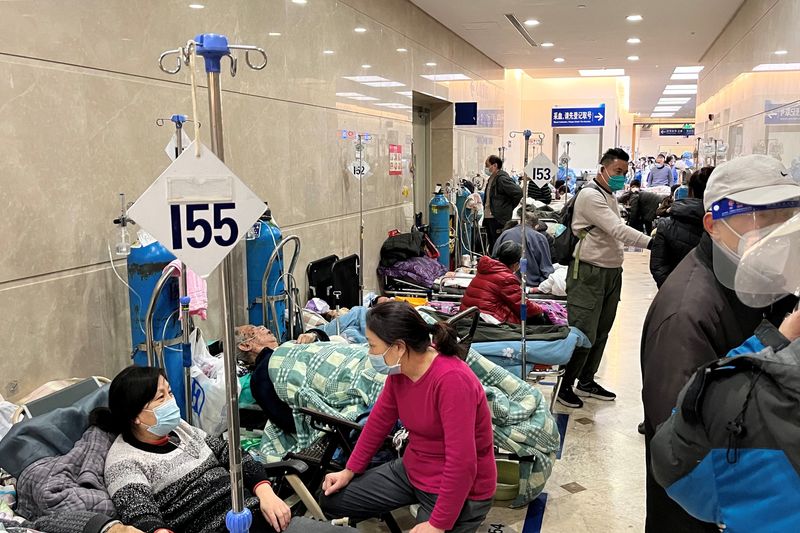By Yew Lun Tian, Farah Master and Emma Farge
BEIJING/HONG KONG/GENEVA (Reuters) - State media in China played down the severity of a surge of COVID-19 infections on Tuesday, while its scientists briefed the World Health Organization, which has been seeking detailed information about the evolution of the virus.
The global body had invited the scientists to present detailed data on viral sequencing at a technical advisory group meeting on Tuesday, and has asked China to share data on hospitalizations, deaths and vaccinations.
The WHO would communicate later, probably at a Wednesday news briefing, its spokesperson said after the meeting. The spokesperson earlier said the agency expected a "detailed discussion" about circulating variants in China, and globally.
China's abrupt U-turn on COVID controls on Dec. 7, as well as the accuracy of its case and mortality data, have come under increasing scrutiny at home and abroad.
China's foreign ministry labelled travel entry curbs imposed by some countries as "simply unreasonable", saying they "lacked scientific basis".
"We are willing to improve communication with the world," foreign ministry spokeswoman Mao Ning told reporters in Beijing.
"But ... we are firmly opposed to attempts to manipulate the epidemic prevention and control measures for political purposes."
The WHO has urged Chinese health officials to regularly share specific and real-time information on the outbreak.
A White House National Security Council official would not comment on Tuesday's meeting, but echoed WHO's calls for more information.
"Public health experts and officials, including in the United States, have been clear it is important that the People’s Republic of China (PRC) share more adequate and transparent epidemiological and viral genomic sequence data," the official said. "This is in the interest of the PRC and the international community and critical to identify any potential variants."
China's shift away from a "zero-COVID" policy that had been championed by President Xi Jinping followed protests representing the strongest show of public defiance during his decade in power and had coincided with the economy's slowest growth in nearly half a century.
As the virus spreads unchecked, funeral homes have reported a spike in demand for their services and international health experts predict at least one million deaths in China this year.
China reported three new COVID deaths for Monday, taking its official death toll since the pandemic began to 5,253.
'RELATIVELY MILD'
On Tuesday, the People's Daily, the Communist Party's official newspaper, cited Chinese experts as saying the illness caused by the virus was relatively mild for most people.
"Severe and critical illnesses account for 3% to 4% of infected patients currently admitted to designated hospitals in Beijing," Tong Zhaohui, vice president of the Beijing Chaoyang Hospital, told the newspaper.
Kang Yan, head of West China Tianfu Hospital of Sichuan University, said that in the past three weeks 46 patients had been admitted to intensive care units, representing about 1% of symptomatic infections.
Two leading scientists and members of the WHO committee said before its meeting they would seek a "more realistic picture" of the situation in China. They did not comment further after it ended.
But some experts doubted that Beijing would be very forthright.
"I don't think China will be very sincere in disclosing information," said Alfred Wu, associate professor at the Lee Kuan Yew School of Public Policy at National University of Singapore.
"They would rather just keep it to themselves or they would say nothing happened, nothing is new. My own sense is that we could assume that there is nothing new ... but the problem is China's transparency issue is always there."
The United States, France, Italy and others have said they will require COVID tests on travellers from China. European Union health officials will meet on Wednesday on a coordinated response.
"As we have said, the United States has offered China vaccines and other COVID-19 support. China has indicated publicly they appreciate the offer but do not need the support. We continue to stand by our offer," a spokesperson for the White House National Security Council said.
China will stop requiring inbound travellers to go into quarantine from Jan. 8. But it will still demand a pre-departure test.
'DANGEROUS WEEKS'
As Chinese workers and shoppers fall ill, concerns mount about the near-term outlook for the world's second-largest economy, causing volatility in global financial markets.
A survey released on Tuesday showed China's factory activity shrank last month.
A "bushfire" of infections in China in coming months is likely to hurt its economy this year and drag global growth lower, said the head of the International Monetary Fund, Kristalina Georgieva.
"China is entering the most dangerous weeks of the pandemic," warned Capital Economics analysts.
The European Union has offered free COVID vaccines to China as concerns grow about soaring infections. Beijing has yet to respond to the offer, an EU spokesperson said.

China has so far insisted on using only Chinese-made vaccines, which are seen as less effective than Western ones based on mRNA technology.
(This story has been corrected to remove extraneous word in paragraph 9)